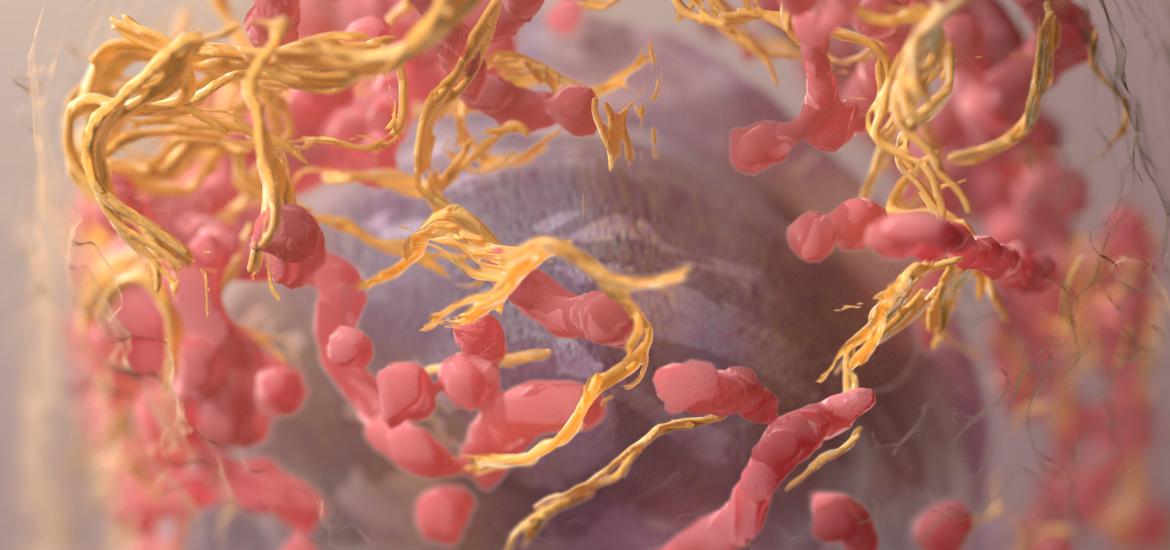
Immatics builds on its PRAME success
PRAME has become a hot target for Immatics, which is now clinically progressing two different modalities against this antigen.
PRAME has become a hot target for Immatics, which is now clinically progressing two different modalities against this antigen.

Fortified with last year’s success of the PRAME-directed T-cell receptor project IMA203, Immatics today moved IMA402, a bispecific T-cell engaging MAb targeting the same antigen, into its first clinical trial.
The study will enrol 45 patients with various solid tumours, the main criteria being that they express PRAME and that they carry the HLA-A*02:01 serotype. The company’s enthusiasm is surely the result of work on IMA203, which served to validate PRAME as a target, as well as preclinical data on IMA402 at last year’s ESMO – a meeting that was decidedly less positive for Immatics’ competitor Immunocore.
Immunocore is one of a handful of other industry players working on PRAME, in its case via an Immtac coded IMC-F106C; this is also HLA-A*02:01-specific, but is designed as a soluble T-cell receptor rather than as a straight MAb.
PRAME at ESMO
It was last September that Immunocore had claimed a major success with IMC-F106C, with an ESMO abstract promising an ORR of 38% across multiple solid tumour types.
However, the story unravelled when at ESMO it became apparent that the denominator was rather higher, implying an ORR of 24%, and moreover that most of the remissions were seen in melanoma. The company’s shares took a knock, and many must have assumed that PRAME was joining the other cancer antigen targets that have disappointed recently.
But in October Immatics pulled off a major surprise, citing a dose-escalation cohort of 27 patients given IMA203 that yielded a 48% ORR. Responses were seen in melanoma, of course (PRAME stands for “preferentially expressed antigen of melanoma”), but also in synovial sarcoma and head and neck cancer.
The big caveat here was that relapses were a problem, with confirmed ORR at six weeks standing at just 19%. However, a separate dose-expansion group using a new manufacturing process showed three of four dose level 4 patients having confirmed remissions at week 12, and together the findings helped the group raise $110m in a secondary equity offering.
And the entire field was helped by the fact that just one day later Roche launched an assay aimed specifically at identifying PRAME. The Prame (EPR20330) Antibody, which runs on the company’s IHC/ISH instruments, is intended for use on tissue samples from patients with suspected melanoma, not to guide the type of pharmacological treatment but to assess whether a tumour is malignant.
Even better?
Along with the IMA203 data Immatics was already claiming that it had an improved version in the works, treating the first patient with a related TCR project coded IMA203CD8, which comprises an added CD8 co-receptor to allow CD4+ T cells to be utilised.
And now comes confirmation of Immatics’ third attack on PRAME, with the planned phase 1/2 study of IMA402, a T-cell engager comprising a stabilised and affinity-engineered domain for targeting HLA-presented molecules, a CD3-targeting region for recruiting T cells, and a silenced human Fc region thought to confer better half life and stability. The trial should yield efficacy data as well as results on safety and pharmacokinetics.
Interestingly, Immatics reckons it will not have to make an either/or decision in PRAME. IMA203 and IMA402 represent distinct therapeutic modalities that could provide “options for a variety of cancer patient populations with different medical needs”, it says.
Industry projects targeting PRAME
| Project | Mechanism | Company | Status |
|---|---|---|---|
| IMC-F106C | Anti-PRAME TCR/anti-CD3 fusion protein | Immunocore | 1 trial, 170 patients |
| IMA402 | PRAME bispecific T-cell engager | Immatics | 1 trial, 145 patients |
| IMA203 | TCR PRAME | Immatics | 2 trials, 102 patients |
| IMA203CD8 | TCR PRAME with CD8αβ expression | Immatics | 1 trial, 102 patients |
| MDG1011 | TCR PRAME | Medigene | 2 trials, 9 patients |
| ADP-GSK PRAME | TCR PRAME | Adaptimmune | Preclinical |
| IMC-P115C | Anti-PRAME-A02 HLE TCR/anti-CD3 fusion protein | Immunocore | Preclinical |
| IMC-T119C | Anti-PRAME-A24 TCR/anti-CD3 fusion protein | Immunocore | Preclinical |
| MDG-PRAME/PD1-41BB | TCR PRAME/PD-1/4-1BB | BioNTech | Preclinical |
| MiNK-Prame-TCR | TCR PRAME | MiNK | Preclinical |
| TSC-203 | TCR PRAME | Tscan | Preclinical |
| ZI-PRAME | PRAME TCR-NK therapy | Zelluna | Preclinical |
Source: OncologyPipeline.
814













